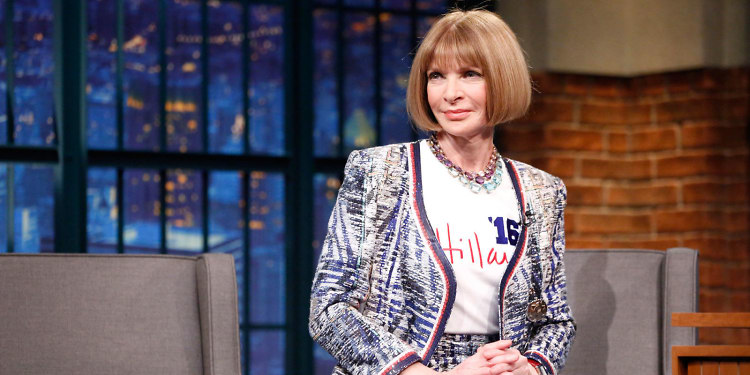
The fashion industry’s attitude toward politics has always been rather apathetic and unbothered, so Vogue’s official endorsement of Hillary Clinton makes us question whether or not fashion editors and their recommendations should be taken seriously in a political context.
Vogue’s decision to endorse Clinton could be because they want to sell more magazines, but also because someone with considerable power over Vogue and the fashion industry is trying to make a statement to advance their career or social status.
In an editorial, Vogue claims: “Vogue has no history of political endorsements… given the profound stakes of this [election], and the history that stands to be made, we feel that should change.” So, what benefit would Anna Wintour receive from an endorsement of Hillary?
The most important thing to keep in mind is her own personal end game. Popular London-based, anonymous fashion blogger, THEIMONATION, says:
“The editor-in-chief of American Vogue is Anna Wintour, a long term friend and supporter of Hillary so it’s not surprising that the elite support the elite. However, I don’t think this is the soul reason behind this step from Vogue. Hillary could potentially be the first female president, and Vogue is predominately a women’s magazine so it’s a likely link between them due to gender.”
This urge to make a political statement can be traced back to the civil rights movement of the 60s. This was an era when fashion was the most political it’s ever been, and what a person wore was immediately subject to a barrage of criticism. Whether it’s a tie, the length of a skirt, a pantsuit or a dress of a spouse, a politician can simply be assessed by the public eye through the scope of fashion. It sets an agenda: Where are they going? What are they doing? Clever dressing then became a tool, and wives of politicians became beloved by the public eye, all because of how they presented themselves.
Fashion now has the ability to affect both political leaders and opinions in the US presidential election. Whether it’s fur, cultural appropriation or racism, fashion is used to make political statements. The perfect example is the Hijab, which is designed to reflect on the political times. Fashion is understood by masses, and that is something powerful that has no ties with society as a whole. Fashion means social trends, which serves society and unites economics with culture.
The fashion industry has – and will – always stir social controversy. Any industry influences politics if it affects manufacturing, but the difference between most industries and the fashion industry is that fashion is capable of bending the rules.
This election in particular has had a full range of surprises, including the candidates. This makes it clairvoyant that fashion does indeed impact politics from a social standpoint, and that figures like Anna Wintour do have ties to politics. Anna Wintour seemingly jumped on the independent woman bandwagon and made a political statement based on being in the right place at the right time.
Fashion magazines give politicians who do interviews or editorials an opportunity to reach out to audiences who don’t fall under the typical political niche. Vogue has nearly 1.2 million subscribers who tend to be educated females. It may be rather risky for a fashion magazine to isolate their conservative readers; however, when you buy a magazine, you are buying into a lifestyle.

It has been almost a century since women were granted the right to vote. Society has come a long way from the days when black models weren’t ever on covers, but with the help of fashion publications like Vogue, the fashion industry vocalizes ‘how to do the right thing.’ Fashion magazines and their editors are now comparable to the editors of a news publication such as The New York Times, and society now has to accept that fashion publications are political influencers.
A fashion editor is now on par with an editor of The Wall Street Journal and, potentially, government officials. This is simply freedom of speech and a contribution in kind to be regulated by the FEC. If Citizens United, a Supreme Court case under assault by Hillary and many others who want big money out of politics, is struck down, this legally counts as a political contribution. It is now most definitely not just an editorial in a fashion magazine. There are now no limits on what ‘fashion’s game’ could do in a presidential election. Should there be any limits?




